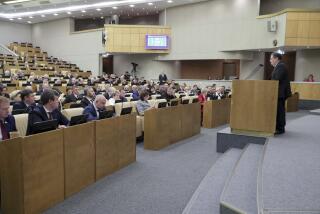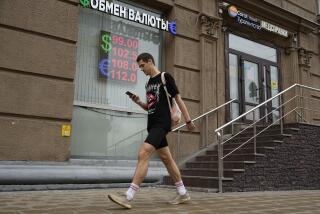Russia Premier Pushes Tough Budget Cuts : Economy: Embattled prime minister squelches rumors of resignation, calls for slashing subsidies.
- Share via
MOSCOW — Russia’s embattled prime minister scotched rumors that his Black Sea vacation might turn permanent with a splashy return to the Kremlin on Thursday featuring a super-strict fiscal plan for next year.
Prime Minister Viktor S. Chernomyrdin’s 1995 budget proposal, seemingly designed to delight Western economists and draw billions in loans, called for such tough cutbacks on subsidies to agriculture, defense and failing factories that the government could get by without borrowing from the Central Bank.
“We need a decisive breakthrough,” Chernomyrdin told a special Cabinet meeting, according to the Itar-Tass news agency.
In the wake of the “Black Tuesday” collapse of the ruble last week and the widespread buzz about the prime minister’s impending resignation, Chernomyrdin’s very appearance in Moscow was something of a breakthrough.
Talk of his departure had grown so persistent that one Moscow radio station reported it as fact, prompting indignant denials, and Vice President Al Gore asked about it in a phone conversation. Much was also made of Chernomyrdin’s protocol-breaking absence during Queen Elizabeth II’s visit to Russia this week.
But on Thursday, the 56-year-old technocrat brandished the new $275-billion budget plan as justification for his days in sunny Sochi, and called for painful belt-tightening to keep Russian inflation under control. The budget has yet to be modified and approved by lawmakers, but the Cabinet gave it a preliminary nod.
The budget has a new ideology, according to Economics Minister Alexander N. Shokhin. Instead of fueling inflation by printing money to pay its debts, the government will cover its expenses by collecting taxes more efficiently, issuing bonds and attracting international loans. The proposal limits the budget deficit to about 8% of the gross domestic product and banks on about $8 billion from international lenders.
“That is the only way in today’s situation for 1995 to become a year of stabilization,” Shokhin told Itar-Tass. Until last week, Russian leaders were claiming that the economy was beginning to pull out of its long post-Soviet dive. Then the ruble suddenly dropped in one day by about 28% against the dollar. From a relatively modest 6% a month, inflation shot back up to more than 10% a month in the first two weeks of October.
The economic outlook was so gloomy that many predicted President Boris N. Yeltsin would soon be scouting for a replacement for Chernomyrdin. In addition to rising inflation, unemployment is expected to hit 1.7 million--more than 2% of workers--by December, an unprecedented level in this nation of former full employment.
Arriving in Moscow on Wednesday night, however, Chernomyrdin assured reporters that he was not going anywhere. “Frankly speaking, I don’t think many people will want to take my place now,” he said.
Russia may be growing more stable, but it still has a habit of going into spasms of political intrigue whenever Yeltsin or Chernomyrdin is away.
Even now that the prime minister is back, commentators expect a shake-up in the government to coincide with a Cabinet report and a vote of no confidence scheduled for Thursday in Parliament.
One Western economic adviser here said it could well be that Chernomyrdin’s whole push for a tough new budget was only a resignation gambit. Chernomyrdin is ready to quit, the adviser speculated, but he wants to be remembered as “the austerity prime minister” and not the man who oversaw the ruble’s collapse.
In Seattle on Thursday, U.S. Treasury Secretary Lloyd Bentsen said that Yeltsin’s overhaul of the Finance Ministry last week apparently had stabilized the ruble.
More to Read
Sign up for Essential California
The most important California stories and recommendations in your inbox every morning.
You may occasionally receive promotional content from the Los Angeles Times.













